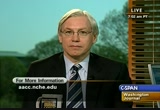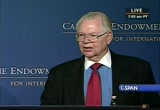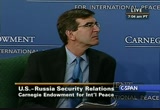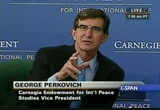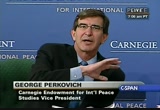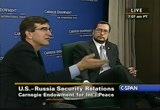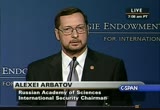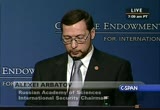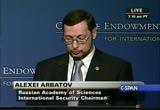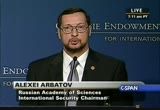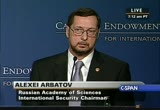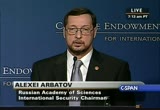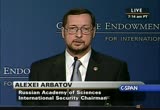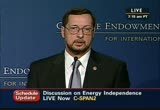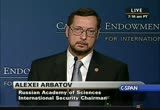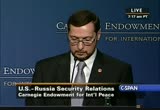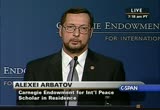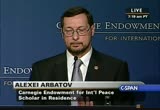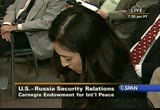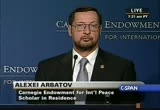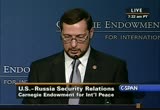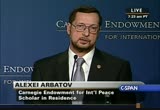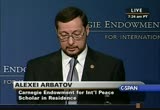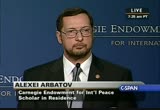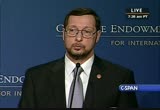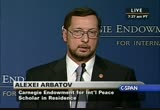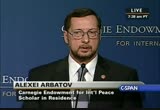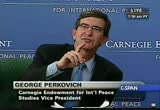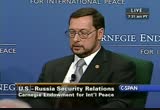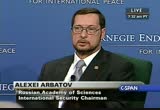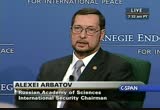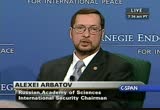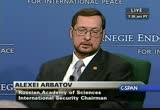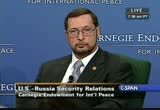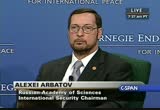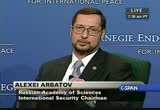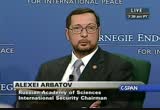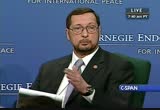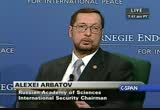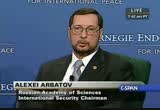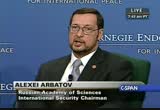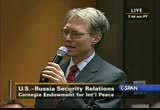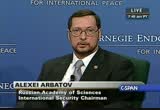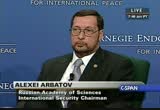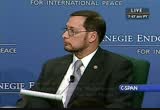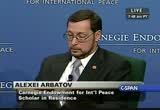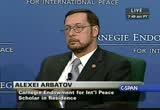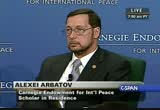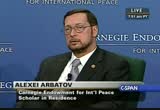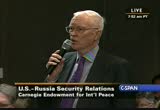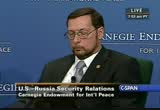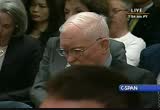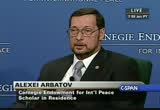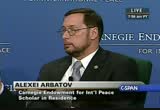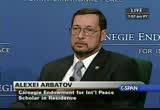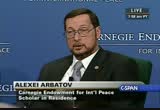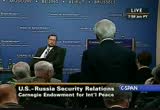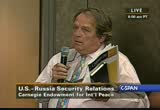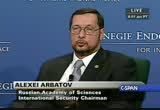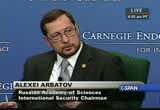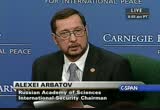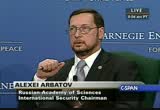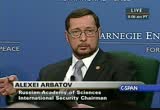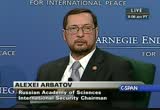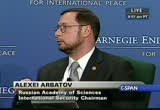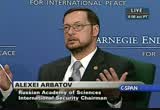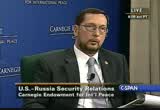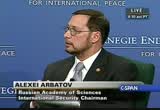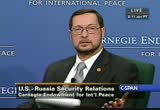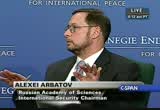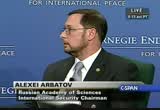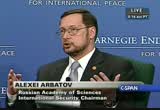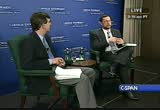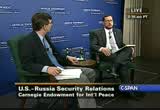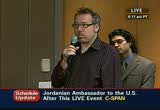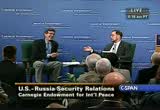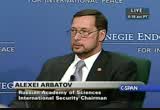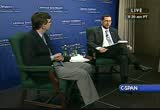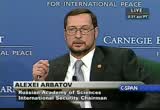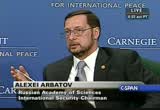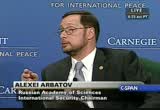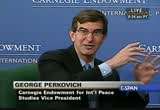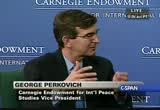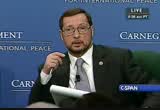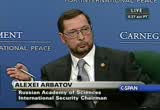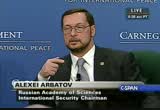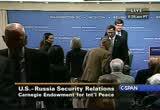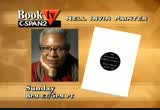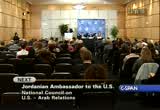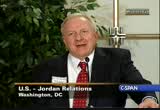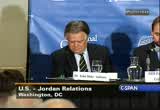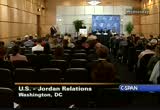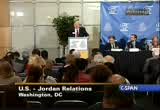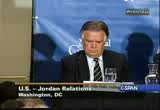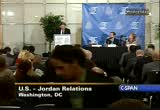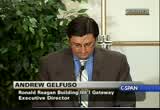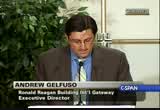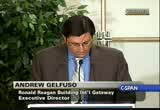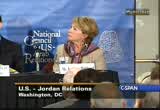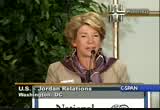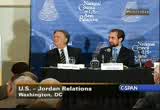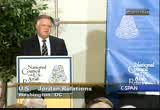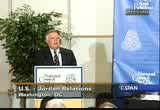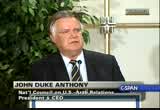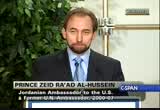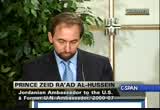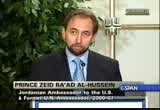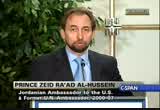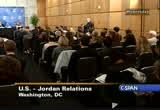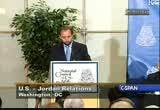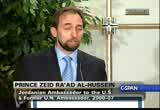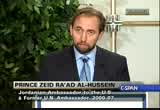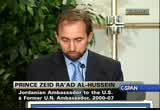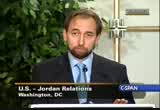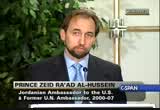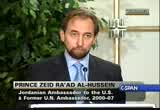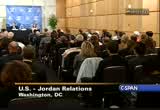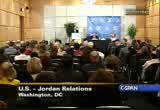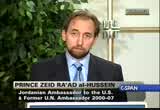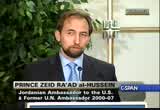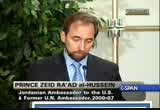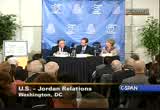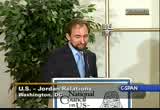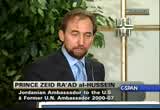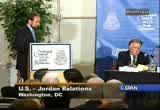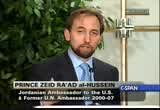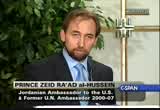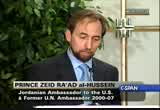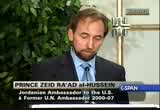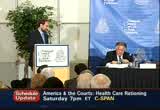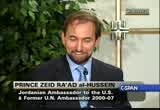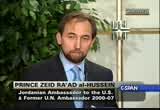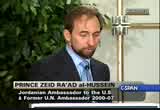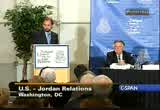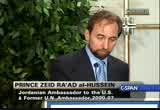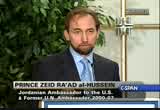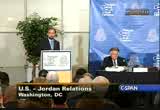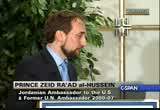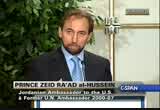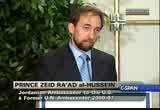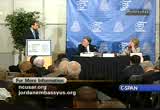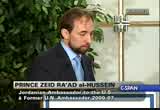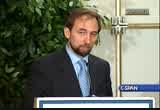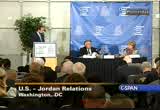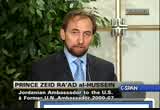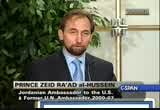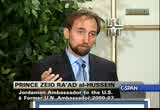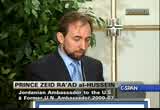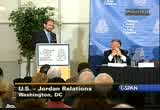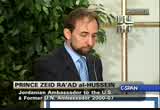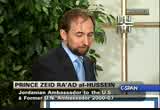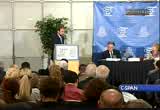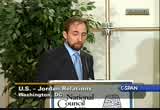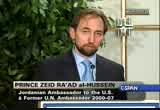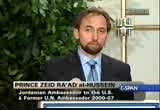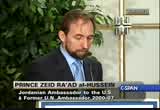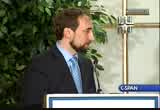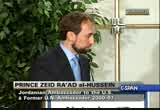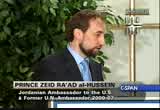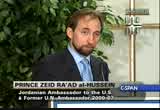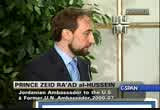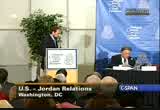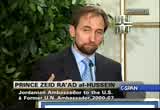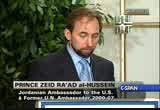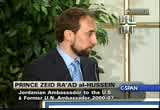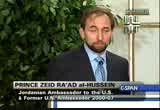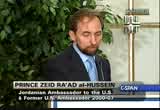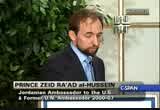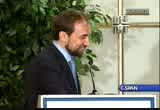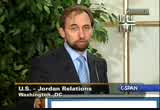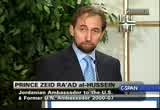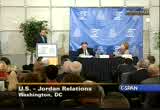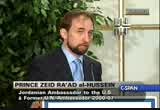tv U.S. House of Representatives CSPAN April 1, 2010 10:00am-1:00pm EDT
10:00 am
be done, but it is not the role of government to subsidize the things we are doing today. thank you. guest: let me just get back to the point i made, which is that we do believe that the opportunities that are colleges provide -- you know, colleges do many things beside the job training that we are focused on today, and for good reasons. we change people's lives through the opportunities that we provide them. the opportunities in the long run pay off. they pay off for the individual, but also for the economy as a whole. and when you have an educated population, your economy overall is going to be stronger and more businesses will be more profitable, and tax revenues will increase as a result. host: this summit that you mentioned, what is it about and when is it happening? a a guest: we do not have a date yet -- guest: we do not have a date yet.
10:01 am
it is probably going to be in the fall and we are told that we will have leaders from across the country. as i mentioned, the obama administration expects a great deal from our institutions. he wants our colleges to be doing more than what they are already doing and getting more students to graduate. i expect that we will also see the administration talking about ways that community colleges can continue the progress they've made in helping more students to fill their goals. host: last call from lakeland, florida. very quickly, we're almost out of time. caller: i attended a community college here in florida that had an accredited teachers. i want to know who regulates the colleges. -- who had unaccredited teacher. i want to know who regulates the colleges. guest: there are both state laws
10:02 am
and local laws in some cases about policy. it depends on the state to what extent the regulation exists. it is a little bit different. most of our teachers -- all of our teachers have advanced degrees. many of the faculty have doctorates. the issue of faculty credentials is not one that we hear many problems about. host: david baime is with the association of community colleges. if people want to learn more about how they function, do you have information and background on the colleges as they will honor website? and what is the web address? -- on your website? and what is the web address? guest: www.aacc.nche.edu. host: thank you for being here
10:03 am
10:04 am
>> we will talk about what has happened over the last several years to the nuclear relationship and the situation of nuclear weapons as russia sees it. it is my pleasure this morning to introduce george perkovich 0 is the director and vice president of studies who focuses on our studies in washington on a clear agenda. he will introduce to you alexei arbatov who is a recognized expert, political leader, and longtime student of the strategic relationship between russia and the united states. without further ado, george, i will turn it over to you. >> thank you.
10:05 am
the start treaty will be signed next week. there are other things that we will ask alexei to talk about an contextualize for us in response to your questions. just as the united states, i believe, next tuesday, the obama administration will preview its nuclear posture, the administration's review of the united states' nuclear policy, russia in february announced its new military doctrine. it will be very useful for alexei to describe that and discuss that with us. also, as today's papers recount, there is movement in the security council, ongoing movement to try to deal with the run violation of security council resolutions and the u.s. or lrussian relationship is
10:06 am
important that discussion. alexei is well situated to discuss the situation with iran. all these particular issues that have a nuclear dimension and how they fit into u.s.-russian relations which the administration began very early seeking to do with its russian counterparts. i don't know anybody better to talk about all of these issues and put all of these issues into context than alexei arbatov. he is the chair of the non- proliferation program at the carnegie moscow center. he is also the head of the center for international security of the institute of world economy and international relations. in moscow. this is the most prestigious -- prestigious russian institute dealing with international affairs. he has played a leading role as
10:07 am
an ongoing adviser of the russian national security council. is a prolific author and has a new book out in russian which covers the horizon of international affairs. it is an impressive book. we are honored and delighted to have an ad -- as a chronicle colleague and have him here this morning. he will take us for some issues and will open up to discussion. >> thank you, the gym. thank you, george. i am delighted and honored to be here again and i thank you for coming. let me start with the new treaty. which is to be signed in a few days. i think it would be the most controversial strategic arms control treaty and the whole history of arms control.
10:08 am
i am tempted to use vice- president baden's formula which he used in respect to health care and applied to the new treaty. but the question is, on which of the two adjectives you put emphasis. [laughter] we have to see the text and see all the papers, all the protocols to make a comprehensive judgment. from what we know at present, some of the judgment may be already advanced. the first thing you ask about a new arms control treaty is, how much does it affect strategic forces? what is the real reduction? the answer is compared to what
10:09 am
text if you compare the new treaty with the one it is part replacing, the reduction is very impressive, by 75%. the reduction by launchers is also very aggressive, by 50%. if you compare it with the salt treaty of 2002 which never became a tree but became an agreement, then the achievement is less impressive. depending on the ceiling of the departing point, it is 10% which is less impressive. if you compare the ceiling of the neutrality, it was forced
10:10 am
deployment. then the official position of the united states which i have already heard is that reduction is bu1/31/1/03. -- 1/3. the treaty has very certain accounting rules. 1/3 of these reductions will be taken care of through a new accounting. in the new treaty, it will be counted as one launcher and one warhead. you almost have all the reductions at the expense of the new accounting rules. there are a number of other accounting rules which make the
10:11 am
job of the military and him -- and industries implementing reduction month or easy that it would look if only judging by the formal treaty. if you compare reductions which are envisioned by the new treaty with reductions which were envisioned by start i, you will see that start run one in seven years introduced actual reduction of warheads by many thousands, 4000-5000 warheads or redress from strategic warheads in the new russia and the united many hundreds of missiles, bombers, and many submarines. from this point, the new treaty is less impressive because for seven years, 10-year duration time, the reduction of warheads will be a few hundred at best and even that, with the new
10:12 am
formal accounting rules. the main significance of the new treaty is not in its fiscal reduction. the main significance is the restoration of the formal, legally binding framework of strategic relationship between the two leading nuclear superpowers. after a long breath, -- break, it has to be keep in mind that we have not had a new arms control treaty for 20 years, since 1991 when sincei was signed, we have never had a tree that was signed, implemented, implemented and entered into force. we had a chain of unsuccessful attempts. but we never had a formal and legally binding treaty and this
10:13 am
is the main significance of the new treaty. basically, the treaty is the salt treaty of 2002 with slightly different ceilings, with a ceiling on delivery vehicles and agreed rock accounting rules and the application procedures. this is not part surprising. the expiration of starti puts a very tight schedule for negotiators of the new treaty. during less than one year of administrations, starting from scratch because in the preceding years, communities greatly to soften the had to reorganize. during one year, they did a great job in coming to a legally binding treaty which will be hopefully ratified. i think it is worthwhile to pay tribute to the russian
10:14 am
representatives who worked very well together especially the carnegie person. i think it is worthwhile to emphasize their great contribution. another significance of the new treaty is that it is a fulfillment of the commitment of the nuclear weapons states by article 6 of the non poor operation treaty. it is time because the review is coming in may. after the disastrous review in 2005, the new conference will define whether we go through disintegration of proliferation regime or restart resetting and fortifying on the basis of the new treaty between the two countries.
10:15 am
last but certainly not least, this is in line with the ambitious goal of the article of the four great statesman and commitments of president obama. this is a real practical step on the road to nuclear disarmament. however, this is not the end of the process. i would say it is just the beginning of the process. because both in the united states and in russia, the process of ratification of the treaty will face a lot of difficulties, a lot of problems. i would be happy to say that russian people enthusiastically wait for the new treaty to be ratified as implemented but that would be a great exaggeration. those russian people who are interested in this subject largely have great doubts about the new treaty.
10:16 am
because nuclear weapons are for russian people now, much more important. they are more important than during the cold war as a pillar of national security. already, even before the treaty is signed during the previous few months, in russia, a campaign started against the new treaty. in an erroneous way, this campaign started by mass of the tax -- by massive attacks on the tree which expired last year. after 20 years of upstart start attacking start i is viewed as detrimental to russian security and was called a traitorous
10:17 am
treaty. i cannot have any other explanation than to is a precursor attacked of the first salvo in the campaign which will be conducted against the new treaty when it is signed and presented for ratification. the reason it is is that 20 years after the cold war, russia feels much less secure in contrast to the united states, the european states, and china and many other countries. it is of russia's own fault. their domestic politics and foreign policy can be bland but the united states and nato contributed a lot to that feeling of insecurity and russia. nuclear weapons now look as the
10:18 am
only reliable assurance and pillar of national security. the military doctrine of dr. clearly spells that out without and reservations. nuclear weapons are one of the few legacies of the superpower status of the soviet union of which russia has a share. after the economic crisis, it greatly diminishes the role of gas and oil exports as an instrument of russian foreign policy influence and role in the world. nuclear weapons, relatively, have become that much more important. certainly, nuclear weapons are looked upon by experts, by the professional community, has the greatest equalizer and an instrument to make up for russian inferiority in conventional forces, in particular with nato getting
10:19 am
very close to the russian borders and acquiring multiple superiority over russian conventional forces as an instrument to make up for russian inferiority in missile technology and space technology. foremost, the long-range precision guidance systems relying on space intermission support with which russia feels the most vulnerable. in parallel with start i, you can sa ee russia as a new complaint over the united states guidance systems as the greatest threat to russian national security. if you look at the military doctrine, the list of priorities for foreign military
10:20 am
threats, you may find that nato expansion is number one, ballistic missile defense and precision guidance long-range systems are number four, non- proliferation threats are number 7 and national terrorism is number 11. you may argue about that. you may prove that this is the wrong list of portis but it is an officially accepted document which reflects the prevailing opinion of politically elite and the strategic community and the government and out of the government of russia. to to be taken as a political reality. -- it is to be taken out as a political reality. the main argument that is to be used against the new treaty is easily predictable. first of all, it does not in any way limit ballistic missile
10:21 am
defense of the united states and does not provide for any certainty about the future ballistic missile defense while placing quite stringent limitations on russian strategic defense for the next several years. secondly, the precision guided systems which will be expanded and will be one day -- one way of reduction than united states, the strategic forces, this will be conducted by converting nuclear weapons. that would be seen as a major deficiency of the new treaty. the reconstitution capability in the past was the number one objection, now it has moved down the list but it is still
10:22 am
important because of the new accounting rules, in particular the irrational deployment principle which counsel workers who are really only on missiles, not the number with which missiles were tested for it it provides the united states with great potential built up from potential missiles returning from storage to delivery systems within a relatively short time. russia will not have this potential because russia is withdrawing, in massive numbers, it's obsolete strategic forces and reducing the ones at a slower rate in few numbers and do not hold -- and the new ones will be loaded so that russia will not have such comparable capability. the main argument in favor of the new treaty and russia is --
10:23 am
in ridge -- inner judge -- in russia, is it is not about production in russia but the united states. russia will have massive withdrawal of systems and small numbers of deployment of new ones. in 10 years, according to the russia current plan, russia will almost fully modernize its strategic forces within the new ceilings of start. it will be at least by 70%, that is the official number. i would like to draw your attention that it includes the plans, development, and deployment of a new heavy missile. and then, if the united states insists on a new treaty and going for the with reduction, in
10:24 am
russia, their position to the new treaty will be much bigger than now because then it will affect newly deployed, very expensive systems rather than put a formal ceiling now that russia is withdrawing the old systems. in order to conduct nuclear disarmament and go with further arms reduction, it would be very important to persuade russian political and strategic community in three principal ideas. the first is that nuclear disarmament will not affect russia appeared to put in a different way -- with much fewer
10:25 am
nuclear weapons, russian interests and the world will not be paid much less attention than at present. second, that the united states are serious about nuclear disarmament. the present treaty, as i mentioned, sent conflicting signals about that. on the one hand, this is the first practical treaty of the last 20 years would probably will be ratified and implemented. on the other hand, artificial accounting rules make a treaty very strange from the point of actual nuclear weapons elimination. there are many doubts and russia about the united states' seriousness with respect to nuclear disarmament. very few people doubt president
10:26 am
obama but many doubt the seriousness of american bureaucracy, military establishment, and the political elite. last, and probably the most important idea, is that the united states is pursuing nuclear disarmament and if they are serious about it, in order to improve international security, rather than in order to enhance the huge superiority in advanced weapons systems, space, ballistic missile defense, conventional forces, and precision guided conventional long-range systems, russian military doctrine presents this new threat as the number one threat among the the traditional military threat to
10:27 am
russia. russian military doctrine demands from the russian defense establishment to assure the fans against space, air -- air- space attack as conventional systems relying on space information. all these three ideas are to be taken very seriously here in the united states and in the west in general. i think it is high time for the united states military establishment, the department of defense, to stop ignoring this growing concern of russia with long-range guided systems. since americans have opened of this new avenue of military
10:28 am
technological development, i think it is up to them to initiate serious consultation with russian military and scientists and provide persuasive arguments that these new systems are not against russia and to suggest confidence-building measures and other initiatives that would remove this number one concern of russia. as of now, as far as i know, americans were just ignoring that and saying that russia is annoyed. they say they are not against russia. much more is needed than that. the same relates to ballistic missile certainly, this treaty is not in ballistic missile defense but it provides for a lot of transparency uncertainty at least for the next 10 years with respect to strategic
10:29 am
defense forces. i think it would be good if the united states provided the same level of transparency and certainty to russia about their strategic defense programs. before and now, the main concern of russia is not the existing systems or the system's water plant in the nearest future but the prospect -- or the system s that are planned in the nearest future. that will define, to a great extent, whether the new treaty is the first practical step on a long road of nuclear disarmament or the last step of many decades to come. thank you. [applause]
10:30 am
>> rather than use my position as moderator to ask questions, i want to go directlyxp to you all to ask questions and i may jump and if there is something that i cannot resist adding or challenging. i want to ask you to raise your hand and when i call you, identify yourself and your affiliation. then we can begin their in the back. ango ahead and stand up, please . >> thank you for an interesting presentation. foreign minister lavrov said he
10:31 am
was more open to the idea of missile defense with the united states after this treaty. can getsx your sons on that from the russian point of view? undersecretary tauscher moved on -- suggested moving on to the prospects of other missiles. what do you think about that? >> i think that cooperation on ballistic missile defense is the most important thing in the long term relationship. we have to recognize that during ballistic missile defense implies military alliance. common enemies, common threats. at present, we are quite
10:32 am
different from that state of relationship. it is not only technically complicated, it is politically complicated. as long as we're talking about some kind of global defense which will cover threats from wherever they may emerge. for russia, that would create great problems with china because china is against any type of bat defense. they would not participate in any of that. for russia, china is not only a great partner but a great concern. russia would not like to enter into ballistic missile defense and make a mistake like iran. a large part of the russian political elite would be strongly against that.
10:33 am
after successful reeducation of the treaty -- successful ratification of the treaty, it would be possible to start to approach this on a step-by-step basis. the first thing that would be very important and not very difficult to implement is to revive the joint data center. , which was agreed to 10 years ago and has still not become operational. having a link and early-warning systems and collect on launches would be important in order to contribute to each others' knowledge about what is happening with ballistic missile tests and launch it. does important also to avoid miscalculation and avoid some
10:34 am
concerns about the tests of the other side. it would be possible to use it as a data collection center but in line with vladimir putin proposal several years ago, to make it operate in real time. that is to send a warning of the ballistic missile launch wherever it happens to both sides and probably to allies on both sides. another step would be to make our cooperation on missile defense practical rather than purely theoretical computer exercise. from a strategic logic point of view, this is possible because it does not create conflict of the interest with our strategic
10:35 am
defense neither russia or the united states have weapons which may be intercepted by ballistic missile defense due to intermediate and shorter-range missile treaty which was signed in 1987 and we should preserve. we do not have weapons that would be targets ballistic missile defense. we do not have medium-range missiles or shorter-range missiles. it would be more logical and easier for us to agree on some joint programs or joint deployments to protect our forces abroad and protect part of russian territory in europe and european territory against possible threats from the south without bringing in the picture the most complicated and controversial factor of china.
10:36 am
if we are successful and that development, we may gain experience to start something more grantor -- more grant. nd with respect to missile defense. that will have to wait to move far enough when we move into strategic arms reduction and alerting our strategic forces so we do not find ourselves in a schizophrenic situation when we have joint strategic ballistic missile defense while still relying on the strategic balance of offensive weapons against each other. with respect to attack to call nukes, i think there is great enthusiasm and the west about tactical nukes and future tactical nuclear weapons reduction and limitation.
10:37 am
i am not so enthusiastic about that. this is not because of strategic reasons. there are strategic reasons for russia to have quite an extensive number of tactical weapons. it is the same reason which made nato maintain technicoltechnicar weapons years ago. it is the ratio of conventional imbalance which is about the same but is in favor of nato and against russia compared to what it was 20 or 30 years ago. in this situation, tactical nuclear weapons, russia will look to be an equalizer in that situation. this differs from the technical and legal part. the united states trying to
10:38 am
achieve new success in the treaty created a serious problem for potential future negotiations on technical minuks having russia to accept an account operational weapons. the united states has gravely undercut the grounds for limiting or reducing tactical nuclear weapons because none of those are operationally deployed. if you proceed on the legal president of the new treaty which certainly will be implanted in people's minds after ratification, you will be able to say when year from now all tactical nukes are not deployed, they are in storage none of them are in delivery systems.
10:39 am
you cannot use the start principle of doing away with weapons through dismantling or limiting delivery systems because you cannot dismantle and eliminate heavy colorable artillery and short-range surface-to-surface missiles with which used conventional weapons to attack aircraft or ships which made use tactical nuclear weapons for naval purposes. you cannot apply the same principle, otherwise you will have to do away with your conventional forces altogether. if you try to limit those weapons which are in storage, you will have to get them out of storage. there is no difference between technical and strategic weapons, at that point. the strategic weapons kept in storage with tactical weapons in
10:40 am
storage, this is not a question of tactical nukes. as a problem of nuclear explosive devices. there is no difference between said technical and strategic. this will have to be addressed sooner or later. this is not something we can address now, especially with the prospect of thousands of strategic nuclear weapons removed to storage in line with the new treaty. both from the legal point of view and from the technical point of view, tactical nuclear weapons would be a very serious problem. to give you one example, russia has about 3000 tactical nuclear weapons. i do not know where this figure comes from. i could never find out.
10:41 am
[laughter] the chairman of the general staff of russian non-forces tested repeatedly that all russian technical nuclear weapons are in storage. the vice premier has said the same, but all tactical russian nuclear weapons are in storage. i have doubts that all of them are in storage, maybe some of them are at airports and military bases but they are in the post pde pots. you have to get in there and teltake nuclear warheads there e a cruise missiles or warheads
10:42 am
for sea-based ballistic missiles and then bringing them to a manufacturing facility and eliminating them. that would be a great problem. my suggestion would be for the united states to remove its technical news from europe to its national territory and russia to keep its tactical nukes only on its territory which actually russia does now. and to have a formal agreement that those nuclear weapons would be kept in storage and not deployed with operational conventional forces. if you want to go further than that and insist that all of them are in centralized storage, you would have to have verification procedures by which russians would be able to come to every american air force and naval base to make sure that in the depots of these bases, there are
10:43 am
no cruise missiles or for any other weapon. in charleston, according to available data, about 100 nuclear warheads or cruise missiles. it would be prohibited and russia should have the right to come to every base and to say that as strategic. if it is tactical, you would have to get rid of it. that might be possible but it would be extremely difficult. >> let us take two questions. >> thank you very much. i have a question on ratification. those of us who have been through other treaties no complicated and politicized ratification debates can they
10:44 am
hear in the united states but also in moscow. can you explain more your thoughts on ratification of whether you think this will go smoothly or will be extremely difficult in moscow. >> introduce yourself. >> i am with the arms control association. your markets are insightful and provocative as usual. can you give us more insight into the thinking on the russian side about the curious bomber warhead counting rule and the new start agreement. ? you think the russians would be concerned about the american ability to do bomber of flooding given the greater historical american reliance on the bomber leg of the triad. , the lack of the kind of inflation of all kinds of problems on russian heavy bomber
10:45 am
aviation during the 1990's for research problems. -- for resource problems. can you tell us why the russians pushed for this provision? >> let me start with the second question. in my talks with russians who are in negotiating position, they were not very happy about such accounting rules. the fact is that neither russia nor the united states have presently nuclear weapons actually loaded to bombers. all nuclear weapons are at depots at the airfield. they are not operational and deployed. under vladimir putin and george bush, russians did not want to
10:46 am
agree to the principle of operational and deployed weapons as the criteria for accounting rules. now, the major russian concession was to agree to that principle. i think president medvedev played a big role in persuading russian military and those who might be opposed to that that that is in the best russian interest to accept that. it will permit russia to deploy more workers on missiles within a set. if the bombers are counted as one or head, there is more space for deployment of warheads on submarine launch ballistic missiles. russia will eventually give -- bring their program to the end
10:47 am
. they might introduce a new missile which will provide russia with local available warhead deployment. from this point of view, this liberal bomber accounting rule may be favorable to russia. >> in talking to people here, the more accurate number would have been zero which is less acceptable and starts to raise the question if it is zero then why do you have them? they are not for strike weapons. they are not to stabilizing so it reflects a really does not necessarily an accounting reality, but it is more of a
10:48 am
political reality that they are useless but you don't want to say that. >> it is not really deployed on bombers. >> pettitte should be 6 -- so then it should be sex. ix. >> first of all, to support and that ratification does not take too long. remember the start ii treaty took seven years for russia to ratify. the position to the new treaty would not be weaker than the position to start ii, maybe it would be stronger. a lot depends on how the size of -- how the size of the
10:49 am
president and prime minister are -- how decisive the president and prime minister are. there will be a big campaign against this treaty and it has already started, as i have mentioned. it is important that the new treaty becomes a ground for better relations between russia and the united states rather than an arena for mutual recriminations and suspicions and accusations. it quite easily may happen but it will be that. in this case, the new treaty will not improve relations as far as public opinion is concerned. that would be very bad. that should be avoided. lastly, the new treaty should
10:50 am
not be ratified as accelerating a weapons program. by way of a trade-off. the united states has a missile defense program that will be used by the republican party as a bargaining chip. in russia, it will be the heavy missile, the new system and some other programs and that also would be detrimental to our relationship. in russia, prime minister vladimir putin is to be engaged by the united states to help the ratification of the treaty. up until now, he has kept silence on the negotiations and of the new treaty. he has never publicly supported it. it is important for the united
10:51 am
states to directly contact him and asked him to do whatever he can to accelerate and to insure its ratification. you have to remember that it is not president medvedev who rules the majority but vladimir putin. he has enormous influence over all the russian military institutions, public opinions, and the party of the majority in both chambers of parliament. he has to be on board. that would be very conducive to ratification of the treaty. >> this gentleman here and wait in the back. -- and away in the back. >> it seems to me that the discussion you have about russia and america moving towards
10:52 am
ratification but some kind of future vision, one thing you talked about were some things that american could do that would be helpful but i thought there was a need, on the other hand, for russia itself to take some vision with that perhaps with the signing of a tree or some more calls for both either together or initiating a vision of where you want to go in productions and for the relationship itself. what could russia to do that would both help the ratification here to provide that vision and make the russian elite see it as a positive? >> request and, let's take the one in the back. >> my question is somewhat parallel. as usual, your statement was important of and perceptive. i had the feeling that if you
10:53 am
have given that statement before the u.s. armed services committee or foreign relations committee that would not have helped ratification on the american side if. you were asked to testify in washington for ratification, not on the basis of what the obama administration will argue but in terms of what would you would argue is in the interest of the united states, skeptical democrats and republicans, what would you say to that senate committee? >> i think russia has to be more constructive on the subject of joint ballistic missile defense. "until now, -- up until now, russia has made some agreements but there is a widespread impression that this group
10:54 am
assessment of threats and whatever is done in joint ballistic missiles has, for russia, lever to put the brakes on an american program. i think it is time to come out with new proposals. maybe you think what vladimir putin proposed on on the joint data center on mitchell -- missile launchers but also move forward whe. vladimir putin and president medvedev proposed that we have to have joint missile defense
10:55 am
with the united sates and the european union. how about the russian people living in asia. ? are they entitled to protection or not? many people are going away from that but still, if we are to have ballistic missile defense coverage in asia and america would like to cover their asian allies, there is the question of china. both russia and the united states, not jointly but in bilateral format in parallel should start serious consultations with china on ballistic missile defense so that china does not become an obstacle to russian-american cooperation. we would have to persuade that ballistic missile defense is not against china. america has to be clear on some important issues.
10:56 am
is china entitled for its own nuclear deterrent against united states, like russia? is china and titled to treatment -- entitled for treatment as a superpower? is china entitled to some information and consultations like the united states are doing with russia on ballistic missile defense in the far east? , providing information, talking about chinese concerns, trying to find solutions like it was between the united states and russia so that they are involved. that is important. my first recommendation to russian government would be to start being very practical and technical on ballistic missile defense. it would be very difficult to come with a grand design of
10:57 am
strategic ballistic missile defense because we still have a balance of forces which are targeted at each other. i think that is something that we have to start the list with strategic ballistic missile defense and take care of rogue states who are the most urgent threats. i think russia should be tougher on iran. i think iran has overplayed their cards. iran is treating russia like the tail was wagging the dog. that should not be permitted. i think russia should take a more tough position, sanctions against iran, for two reasons. this is because iran has crossed to many barriers, too many red lines and secondly because this is a prelude to war
10:58 am
in the persian gulf. if it is not the united states, -- if it is not because of the united states, israel would not tolerate iran getting closer to nuclear capability. this is the argument i would use in russia and the united states, that the new treaty should be the basis for a much greater calculation on the fence and on iran. it can be like that. the fact of signing and ratification of the new treaty will already affect iranian policy. they are touchy on the question of russian-american policy. whenever we have contradictions, a rent toughens its position immediately. -- iran toughens its position immediately.
10:59 am
>> terry taylor for the international council of life sciences pres s. given your view that this nuclear agreement, if it is ratified, is a big political deal rather than a military one, i was looking for your views on the political troubles arising from this in strengthened cooperation between the rrussia and the united states, how do you think that the leading political establishment would respond to the view you expressed on iran? is there a real prospect of real collaboration between russia and the united states on this?
11:00 am
>> a quick question -- it seems to me that you predominantly reference the perceptions of what we might call the key leaders in russia -- the elite in russia and to what extent is the popular opinion in russia concerned about the specifics of a nuclear arms agreement and also, to what extent is popular opinion concerned about the gap between the actual and perceived power in the world between the united states and russia? . .
11:01 am
11:02 am
of foreign policy problems. second, it makes up for progression inferiority in other aspects. it will take a lot of persuasion. hopefully a clear stance by the prime minister to make russian public opinion complacent about the new treaty. russian public opinion is enormously concerned about russian vulnerability, the economic liability, financial vulnerability, a vulnerability to terrorism, vulnerability to nato, and in prospect, to china. it recently has come to the
11:03 am
foreground of russian public debate, and there is much greater concern that is openly expressed about china and the way china treats russia, and the way things may change in 10 or 15 years with respect to china. for many people, this is an additional argument that we have to avoid making china an enemy because obviously the balance is so much in china's flavor -- chuck's favor -- china's favor. we have a huge border with china where russian and the structure was virtually dismantled. with respect to iran, i think that russia will support
11:04 am
sanctions with some exemptions. the ban on weapons transfer will not be supported. russia would certainly provide defensive weapons to iran. not so many, after all. iran is not our primary partner any longer. but this ban would not be supported in russia. some things that are not proposed that may come in the debate like doing something with [unintelligible] project, russia would not agree to that. russia would agree with other sanctions, particularly the embargo on supplies to iran of oil products, gasoline, and others. that will meet no objection from russia.
11:05 am
the main problem is to have germany firmly on board and to persuade india. with india, it will be very difficult. india makes iran its primary ally in the indian ocean and they're building a military port facility in iran, competing with china. china is placing its emphasis on pakistan and myanmar primarily. so it would be 80 gm-economic data it would be a geode- economic game. in principle, there should be
11:06 am
sanctions, but sanctions should not be at russian expends. the most effective sanctions would be an oil embargo. that's a subject for the united states to negotiate now with russia, but europe, japan, china and india. after a new wave of sanctions, it would be wise to revise our policy toward iran. i think the previous crop -- the previous policy, no encouragement, safeguards, it has not worked. -- no in richmond, safeguards, it has not worked. unless there is a threat of an embargo or military action. i think we should change the emphasis to the primary emphasis on iaea safeguards, the
11:07 am
acceptance of the 1997 [unintelligible] the second approach might be to shift the emphasis to agree to make iran agreed to withdraw and rich uranium elsewhere. not keeping the stock of enriched uranium, while having the permission to continue operating its existing cascades of centrifuges. some new ones is needed with respect to enrichment, and said of stating once again for the sixth time, no in richmond, or else nothing. -- no enrichment, or else nothing.
11:08 am
do not expand further and agreed to withdraw the low-enriched uranium to moscow will it -- where it will be converted to fuel rods and returned to you for your research reactor. maybe that would be a more effective approach and then iran could say was a victory that we have the right to have industrial enrichment or whatever they call it. on the other hand, it makes the time between political decisions a nuclear weapon, much longer than if iran kept the stocks and stopped the centrifuges. >> going back to the earlier questions and things you said
11:09 am
about nato and the number one threat perception in russia being made at. let me ask the question a 5- year-old asked. what is it that russian security things nato would do to russia? it's fine to say nato is a threat, but what is it that russia has what is the military action nato would take against russia that causes all of this concern? >> the russian military doctrine is something like [unintelligible] music, it's not as bad as it sounds. the globalization of nato and movement of data to russian borders is the number one military danger, not threats. russians make a difference. threat is something that is already here that threatens war.
11:10 am
danger is something that potentially might lead to bore. in the list of dangerous, this is number one, but it is not on the list of threats. there is a specialist of threats and nato is not mentioned there. second, moving nato military infrastructure, moving alliance to russian borders, this may be hair splitting, but it's different from saying nato movement to russian borders. russia is concerned about infrastructure. ballistic missile defense structure in romania, air fields in lithuanians. russia cannot understand why it is going on. there is no terrorist threat or rogue states. that is about nato.
11:11 am
in principle, there are political and psychological biases with respect to nato and nato expansion. it is seen from russia as the west taking advantage of gorbachev's soviet union and yeltsin's democratic russia. this is not to eliminate -- this is not to eliminate those countries from, misrules. yeltsin decided to liberate delayed -- in neighboring soviet republics from communist rule. neither of them expected nato to move to take this space. russia considers post-soviet space as an area of legitimate interests. and it really is. the only problem is russia does not formulate its interest in a
11:12 am
tangible and clear way. that has been my problem for many years. i tried to persuade them if they would formulate in a very precise way what are your economic and other interests in each particular neighboring country, the west might look at it in a much less hostile way rather than one russia says this is our area of national interest which is often seen as neo-imperial attempts to dominate. russia does not want nato to take over post-soviet space under whatever pretext and deprive russia of its legitimate interests toward russia as nec minorities and economic investment and everything russia has with respect to that space.
11:13 am
there is concern that some conflict in the caucuses, which still remains quite likely, may bring russia and the wet sand and to direct confrontation -- and the west into direct confrontation. if nato comes right to the russian border from the west and from the south, that is why russia says that. in the new military doctrine, it is formulated in a very cautious way, just like the formulation on nuclear-weapons. it is worth mentioning here because in some short time, russia will come with its nuclear posture review.
11:14 am
russians waited and waited for this to come with their own military doctrine. then they decided not to wait any longer but then as military doctrine was effective by the thrust of president obama for nuclear disarmament, by the information we have that the posture review was delayed because of obama wanted to have some less traditional formulation, and by negotiations and resetting relations -- since 1993 when first russian military doctrine was formulated, we have never had a doctrine that would be so cautious and conservative on nuclear-weapons as the present one. it formulates only two situations under which russia may use of nuclear weapons. one is in retaliation afford nuclear or chemical or biological attacks on russia and its allies.
11:15 am
second, to repel overwhelming conventional aggression which would put under doubt the very existence of the russian state. that such a tall order that i cannot think of anything more liberal than just and equitable pledge. this comes very close to equivocal no first use pledge. it is already weapons of mass destruction, no first use pledge. the very existence of russian state, it's difficult to think what should happen to doubt the very existence of the russian state. maybe america defaults on all of its investments -- [laughter]
11:16 am
>> that is an important point about the doctrine because it has not been discussed. either that language or demeaning and that is different than it seemed like it is going to be months ago. >> a lot of people and high officials were improvising on the subject come out with sufficient knowledge of the subject and there was a lot speculation, preventive strike, pre-emptive strikes and so on. nothing of that is in the new military doctrine. the previous ones that russia might use nuclear weapons in case of conventional aggression in critical situations. but that is a very amorphous term. the present term is i would say very conservative. >> thank you for this good
11:17 am
conversation. the u.s. is behind on its commitments for dismantling nuclear weapons. in fiscal year 2011, the obama administration has significantly increased funding for the laboratories, some argue some of the funding is not necessarily needed for reliability means. how do russian negotiators view these increases and the backlog of dismantlement and does it affect any future negotiations after the start treaty. >> we will go with you and some of time have left. >> i base slightly different version of the question from a five-year old. given that nato was created as primarily a buffer against presumed soviet aggression, now
11:18 am
that the soviet union no longer exists and presumably the threat of russian aggression is at least substantially reduced, why do we even have nato? >> it's great to ask a russian those questions. >> i will leave the second question to you. why do we have made no? >> why do you think we think we have nato? [laughter] >> with respect to laboratories in the budget for stewardship of those things, it has taken russia and a very complex and way. nobody is very concerned about it. weapon storage business something that will have to wait for many years before nuclear disarmament comes.
11:19 am
what it does, that would be a real hard core nuclear disarmament. we're dealing with launchers and delivery systems. it is peripheral. even as slowly as we go with reducing missiles, bombers and submarines. those russians who are responsible for watching americans would probably interpret at as a way to pacify republican opposition in this set, the beginning of horsetrading, and even more on future [unintelligible] >> russians are good reading things, so that's a good interpretation. >> was nato, -- with nato, russians were not against nato in the early '90s.
11:20 am
when the soviet union agreed for german reunification within the nato alliance, russians looked very well at the at and considered data to be -- looked very well at nato and considered a dead to be good and there was a top of russia eventually joining nato. yeltsin wins even made a very conspicuous statement saying russia will put the question of joining nato [unintelligible] and it produced such a reaction that corrected it in a few days, saying the typist made a mistake, that russia will not participate. but then, the attitude toward nato started to change. the crucial turning point was the bombing of serbia and.
11:21 am
after that, at russia's started to see nato as an aggressive alliance that used its force arbitrarily out of united nations security council framework, out of for a mark of international law, at will. what is more importantly that it did not change the official attitude toward nato, but the grass roots, russian attitude toward nato. i lived at least half of my professional life in the soviet union. i do not remember ever seeing such an outcry of anti-nato, and that-western movements at the grassroot lovell of the russian public as in 1999. the more official propaganda was
11:22 am
coming against nato. the more russian people like nato. but that changed dramatically after 1999. then, russia started to judge nato not by the nature of the state's which are native members, whether democratic or not quite democratic, but by the nato actual functions. by the actual operations. the operation in iraq, which was not a new operation, but the united states and a number of nato allies, intervened without obvious, clear reasons, that was taken in a very hostile manner. the predominant opinion in russia is that nato is an alliance which first of all tries to take the ground which
11:23 am
was liberated and left by the soviet union and russia, to come to the russian borders and prevent russia from using, exercising its legitimate issue in post-soviet space. also, nato wants to become global and elbow away or substitute the united nations as an operational body for peacekeeping or intervention whenever nato decides to do that. >> before we go to the last question, i was reminded, and it's a point you have made a number of times, first of all, the only nuclear arms control experience in the world is between the u.s. and the soviet union and the u.s. and russia. the treaties and experiences we have had thus far have never actually verify the part that
11:24 am
goes boom. it has always been the delivery systems. i remember briefing members of congress a few months ago and i realized they did not realize that arms control had never dealt with the part that goes boom. that's how i explain it. there is the part that flies the thing and a part that goes boom. we have destroyed this parts that fly but never dealt with the parts that go boom and he said, you are kidding. i said there are weapons that have been dismantled, it just was not verified and counted. many of the lights when you turn on your lights in your state, the power is supplied from the fuel by that. and he said you are kidding me. >> you are talking to children this way? >> and member of congress. [laughter]
11:25 am
>> at some point, when the experience of arms reduction, what it goes further beyond the u.s. and russia, we will be into this new domain of trying to count warheads and verify warheads which has never been done and raises these issues are very complicated and intrusive you are referring to, including the people's healthcare alignment and i'm sure that all work great. last question. >> there is a lot of attention focused on the upcoming review conference. apart from the statement, which is to is there anything the russian federation is planning or you would recommend as an
11:26 am
initiative to achieve consensus of this review conference, for example, at the last one of the mother was a russian proposal with regard to converting the middle east into a zone free of weapons of mass destruction. >> you are a great authority on that. i feel a little bit awkward discussing this subject. however, as far as i know, russia will not come with any surprise to the review. nuclear-free zones, safeguards, multinational fuel cycles, the usual menu of things which are to be discussed. if you are asking what i would recommend to the russian government, my response is i would recommend to the russian
11:27 am
government and the p-5 government to concentrate on one issue and push it through instead of discussing 10 issues and having another document of buried general character. that would be possible on the basis of this achievement of the new start treaty. the political position would be fortified. my choice of all the issues would be to universalize asian -- universal was asian -- universalization. let's leave the discussion to others, but let's target this particular subject.
11:28 am
let's try to pull for a resolution that would recommend to nuclear supplies group to link all future deals on nuclear transfers, technology transfers, and material contracts to citing [unintelligible] . that would mean going forward in the regime and rap -- than just having another general discussion of all the great problems associated with the regime. >> thank you. i would like to thank all of you for coming. i think russia is lucky in the world is lucky to have someone as talented and thoughtful. i think you understand why i say that. we're very grateful you appeared
11:29 am
11:30 am
>> the associated press is reporting the chinese president will take part in a nuclear summit in the u.s. on april 12th and 13. president obama is leaving washington this afternoon and traveling to portland, maine where he will deliver remarks on the health care law. we'll have that live at 3:25 eastern on c-span. the president will travel to boston to speak at several fund- raising events this evening. in washington, the administration is setting new gas mileage standards for cars and trucks. the environmental protection agency and transportation department will unveil the new rules for fuel economy aimed at getting more miles to the gallon for gas-electric and hybrid cars. the associated press reports 2016 model year vehicles level -- less fuel efficiency targets of 35.5 mpg, an increase of 10
11:31 am
miles a gallon over current standards. >> this weekend, on the quality of tv" from the virginia festival of books -- the best- selling book on the life of henry l. wax. then the mchale gorbachev's role in bringing down the soviet empire. then, the invention of a white race in the "history of white people." >> flexible policies actually make employees more, not less productive. as you all know, instead of spending time worry about what is happening at home, your employees have the support and peace of mind a desperately need to concentrate on their work.
11:32 am
>> watch something on c-span that you like to share with friends? at the new c-span video library, eat-in search it, and share it. over 160,000 hours of video from yesterday or last year. every ec's ban program since 1987. the c-span video library -- cable's latest gift to america. >> will hear from the jordanian ambassador to the united states at the national council of u.s.- arab relations.
11:33 am
>> i would like to invite the cardinal archbishop to offer for all of us a voice to our prayers for peace which are set in many languages from a faith traditions and with many divisions, each looking with our own keys and faith traditions to find that vision of peace. >> i am happy and very pleased to be able to offer a prayer. sometimes because you come early to a meeting, you become the career. if that is what it takes, i am happy to come early. let's put ourselves in the president some of it got. -- in the presence of god.
11:34 am
we're part of the abraham extradition, -- abraham like tradition, jews, muslims and christians. we are anxious that there be peace in this part of the world and we pray for it. we pray as our holy father, pope benedict, a parade in the holy land for peace in the holy land, for an israel with solid borders and understanding that there will be peace and that israel has the right to be there and the right to be a nation respected among nations of the world. we pray for peace in palestine, a palestine that needs to have its own borders and has to have its own viable situation with peace and justice for all its people. we pray for all of those who
11:35 am
live in palestine and israel, that they may find peace, one with the other. some time ago, the arab world spoke of a common word as they began their conversation with the christian world. the common word was love god and love neighbor. that is soundly all our traditions. it is found in the great ancient jewish tradition of the hebrew scriptures, it is found in the koran, it is found in the gospel. love of god and love of neighbor. give us the grace to have a love for you and each other. if we love each other, we will be at peace with each other. if we love you, we will find that peace. we ask you to bless this assembly and bless the ambassador, his royal highness, the less than a champion of peace for many years. we look forward to his words.
11:36 am
may be inspired by you and may are gathering here as we come into this holy time of the year because for to wait for you and all those who believe that one got. all this we ask in your early name. amen. >> thank you for sharing your thoughts and prayer with us. it is now my pleasure to introduce the president on the council for u.s.-arab relations. he has been at this work of the arab world and near east for many years now. he's the product of vmi and advanced international studies at johns hopkins university here and a ph.d. from georgetown university.
11:37 am
i want to particularly note that the work of the national council -- it's never the work of one man. every good work takes a person of vision. the national council has been his vision for more than a quarter-century now. he has traveled widely in the region and bested deeply in understanding and being a foot in both cultures, learning language and culture, sharing traditions with great joy and great insight. as we share this occasion with bridges of understanding, there are few who have done more to build such bridges of understanding. i like to say that the hyphen in
11:38 am
our name is a bridge that goes both ways between the united states at the arab world and vice versa between arab culture and in sight for which we can learn a great deal. it is my pleasure to introduce dr. john duped anthony will introduce the other speakers. -- dr. john duke and the knee. >> we have a word of welcome from the ronald reagan building and the international trade center. this particular center and its facilities have been host to a number of national council on u.s.-arab nation and events. it has become the leading place to have public affairs events in the nation's capital.
11:39 am
>> thank you. a pleasure to see you here today. welcome to the ronald reagan bill yet -- ronald reagan building and international trade center. i would like to welcome his royal highness and distinguished panelists, dignitaries, and measure -- and members of the foreign policy community and press. we would like to appreciate -- and our appreciation to the cardinal for his opening and understanding foundation who helped to plan and organize today's panel. at 3.1 million square feet, the ronald reagan building international trade center is the largest building in washington d.c. and is considered the crown jewel of the gsa fleet of buildings. is the second-largest federal building by the pentagon. the trade center contains a number of public and private sector tenants as well as 27
11:40 am
conference rooms and five store catering. as the programming arm of this center, the office for trade promotion works with an extended network of public and private sector partners to bring a host of international trade and open to the public. we work with these trade events to foster international dialogue of greater understanding of cross-cultural communication in hopes that stimulates greater peace and economic development around the world. in addition to being one of washington dc's premier trade venues and conference centers collier the world trade center of washington dc. the world trade center association is a non-profit, non-political association headquartered in new york with 300 numbers around the world in over 90 countries, including the center in iman, jordan. in total, the reagan building works with a divorce host four
11:41 am
events. some of our offense -- works with a diverse host of groups for a events. there is an off the record commentary regarding the administration and congress agenda for this year. have a unique event featuring a nobel prize winner who will be speaking on his new book, " building human business." on behalf of the general services administration and the trade center, thank you very much. [applause] >> thank you. we are pleased and privileged to be administering and hosting this events in association with bridges of understanding. it was a vision of the immediate past, the ambassador of jordan
11:42 am
to the united states who is with us today as are several other arab ambassadors. in addition to our own ambassador from jordan who is speaking today. kathryn hubbard is an individual who of atomizes the grass roots, nonprofit, non-political, non- governmental aspect of activism and civic engagement and public affairs. she is a member of the foreign scholarship board of the fulbright commission. that pleases us immensely because the late senator, j. william fulbright, was the chairman from the inception of the done so -- the national council's advisory board.
11:43 am
>> thank you. good morning and welcome. is a great honor to be here and i wish to thank the national council for this wonderful opportunity to co-hosts this event. we greatly admire and share their message of -- their mission of building understanding, education and awareness of the arab and islamic world. we admire the terrific work you do, with the model arab league's, your national policymakers conference, your outstanding publications, student internships, you have been doing this for 27 years and probably more. we are just four years old, but we admire what you do and are honored to be a partner with you in this. it is a great honor to welcome the ambassador because bridges of understanding did have its founding with our other co- founder, the former ambassador and his wife.
11:44 am
they serve here in washington for five years and we became friends. we initiated the founding of bridges of understanding, which is to build and promote understanding between the u.s. and arab world. we do this primarily through education, youth, culture, arts and the media. i want to give me some examples of the projects we support. they range from a rally held in the summer of 2008 which showcased arab musicians and artists and comedians to a program called sports for peace which brought young iraqi basketball, women basketball players to the university of tennessee to play basketball better and learn leadership skills. to the world digital library that helps to translate great arab works into english. when a project i would like to
11:45 am
tell you about that is a program to connect american high-school with arab high-school shop via videoconference. why we would like them all to give each other in person, that is not always possible. through the video conferences, students talk about foreign policy, government, women's rights, education, the role of faith in their lives. the environment. they getting gauge in very frank conversations and through this, they dispel stereotypes and build an understanding and awareness of each other's perspectives and come away thinking i'm going to go and study arabic. i'm going to go to the middle east. since the middle east say i am interested in america and maybe they're not what i thought they were when i first started. we have 12 partnerships and 2025 for next year. i would love for you to give me suggestions of how schools in the arab world we might connect with. one project in 2011 is called a
11:46 am
media fellow program. we want to bring to an emerging women journalists over from throughout the arab world for a briefing session about journalism and media training in washington. then they will go stay in homes throughout the united states and get exposure to local members of the media and stay in the homes of families and wind up with a program and leave new york. we hope in the end we can do more exchange of media fellows. we want to do this every other year. so to all of you better here, you all have a great knowledge of the arab world. you have great curiosity and a great passion. i would like to encourage you to help us in building bridges, come forward to us or our executive director with the ideas. send an e-mail. we love of entrepreneurial, grass-roots ideas and we're open to anything. thank you very much for being here today.
11:47 am
[applause] >> thank you and congratulations on your role in co-founding this organization. we hope it is but a first of numerous occasions where we can join hands in projects, programs, events and activities. it is my pleasure to introduce our speaker, his royal highness. this individual embraces in his own focus, professionalism, a whole host of issues of concerns and needs and objectives pertaining to all those who have come today. as the ambassador of jordan, he was preceded by the personally made reference to earlier but serve at the united nations for more than six and a half years as his country's permanent representative to the united
11:48 am
nations and prior to that, as the debt be read it -- that the rep with the rank of ambassador. he has been involved in peacekeeping, peacemaking, conflict resolution and has a ph.d. from cambridge university of law. he represented jordan's delegation to the international court of justice which heard the issue pertaining to israel building of the wall separating additional areas of the occupied west bank territories from israel proper. thereby diminishing what would have been the 22% remaining of the palestinian territories for a palestinian state down to 14%, if they are able and lucky to obtain that. he has been involved issues pertaining to justice and international law and was present at the creation of the
11:49 am
international criminal court for which many americans have various questions related to public policy. he has been as focused as any of the arab ambassadors in washington on the final status questions pertaining to the arab-israeli conflict. jordan is one of the two arab countries that has a peace treaty with israel. the other is egypt. but jordan is as concerned with the others as the final questions of wars, settlements, or car refugees, and much else. please join me in welcoming his royal highness. [applause] >> thank you for that very warm welcome.
11:50 am
cardinal, it's an honor to see you here. i hope you will correct me if i go astray in the next few minutes. i am delighted to be with so many friends here. as you all know so well, i come from a culture smitten with a -- i should say smitten with speeches, the love for the oral method of communication. so much so that often, after delivering a long speech, i would sit next to my wife and, like all men who are vain and insecure, i would look at my wife, feeling confident i would say to her, what did you think? and she would give me a look at only a wife can give and say to me, you missed three opportunities to sit down.
11:51 am
[laughter] i say this because yesterday, i was sitting with my colleagues at the embassy and i was mulling over what i would say today and i came to the conclusion that really there is nothing to say beyond that which could be perceived to be banal or so well trodden by repetition that it is of little in it -- little interest to an audience. had not the circumstances of the presence, with -- this of the present come with a string of crises that string from the mediterranean to asia began to wind into a not so complex and challenging, the words almost become meaningless in the face of a fate in which we have little choice but to submit to, with the recognition that our
11:52 am
collective will -- has brought us to or not brought us to a defining point. we should take stock of all the recent positive developments that have occurred in the middle east. i was reminded of these developments yesterday when i met a group of friends who are journalists. naturally, the successful formation of the lebanese government is something to be applauded. the successful conduct -- successful conducting of balloting in iraq is likewise something we must take pride in as a people in the middle east. as we all know, the challenge of putting together a government is hugely difficult. nevertheless, one appreciates how difficult it was to just told the election and all of the
11:53 am
work was done by the iraqis themselves, from a security standpoint, from the point of organizing them, i think this is something we'd to very much appreciate. there are of course signs that the relationship between the united states and syria are improving. fits and starts, but generally, moving in the right direction. most recently, at the arab summit that included in libya a few days ago, it was clear that, notwithstanding all the pressures placed upon the arab peace initiative not least by the fact that israel has yet to embrace it, the arab commitment to the initiative has remained steadfast. but do we not also recognize
11:54 am
arabs and israelis alike -- and this is to be considered at the level of government -- present a rather sorry picture of ourselves in terms of how we have responded to this conflict. when one considers of the report issued couple of years ago been by embed the strategic foreside group, an indian think tank, about the lost earnings for this region since 1991 as a result of the arab-israeli conflict, the estimate was up to 12 trillion dollars loss in earnings, have the potential wealth of the region plowed into weapons and programs either associated with the conflict or as a result of investments lost because of the conflict, is it not the case we
11:55 am
can argue we are a burden on ourselves and the rest of the planet? are we not also a constant threat to peace and security of the planet, given the center of a bull forces -- giving the centrifugal forces that could be looked into some momentum or something to happen in jerusalem, a point that will get to shortly. in addition to being a part of a clear a constant threat to the committee. additionally, one can make the argument we are a non-player when it comes to the larger discussions occupying the international community. i cannot think in the last 60 years, and i stand to be corrected, of one of major initiative divorced from the middle east, that has nothing to
11:56 am
do with anything connected to the middle east, that the arabs or israelis presented in the form of a solution or an attempt to answer questions, for instance whether it evolves around grinding poverty, sustainable development, issues of a broader global nature. i cannot think of one initiative. is it not the case we are non- player? if you look at all three of these dimensions, one can argue that we as a region are a sorry bunch and integrated, we would clearly deserve a big -- and if graded, we would deserve a big f. there is the other question of whether we are truly deserving of a peace, in particular a middle east peace. when one considers the number of opportunities we have lost
11:57 am
either by design or through circumstances since 1967, can we claim right to peace when one considers that large segments of one population is so ready to be little the colossal crime that was the holocaust while on the other side, there exists a large group of people who cannot get past the effects of an occupation and the degradation of other people, itself and ignominy. are we so deserving of peace when the denial thereof can so easily be traded in a rhetorical exchanges? are we so deserving of peace when the conflicts seeming is a necessary for peace can so easily be upstaged by the more
11:58 am
primitive feelings of fear and insecurity? are we deserving of peace when we can so easily cede ground to extremists and those with views of the extreme? perhaps, taken from that angle, we may not be so deserving. and yet, as we all know, there are people who continue to suffer fearfully on the one side while on the other there are people who are fearful of future suffering. this situation as we all know is simply intolerable. there is another constituency, a young regeneration aspiring to survive on collective stupidity. if they are to solve the broader and more challenging and complex
11:59 am
problems, they must find shelter and find it soon in regional peace which will at long last bring some relief to this particular part of the world. jordan, under his majesty's leadership, like many arab countries, is deeply support of president obama's desire to establish peace in our region on the basis of two states living side-by-side in peace and security. we believe this is entirely doable. there is, after all, when it comes to peace that thing that is impossible. in 1995, i was serving with the added nations in the former yugoslavia. by the time you reach the month of july, we are all convinced there would be conflict and
12:00 pm
bloodshed in bosnia for another 10 years. the fighting was intense, the weaponry was plentiful, the hatred was apparent, we had exhausted every permutation of a peace agreement, let alone ceasefires and cessation of hostilities. we simply could not see a way out. if someone had said to west, in six months, the fighting would stop or at least the killing would stop. one could argue the fighting has continued by other means. but the killing was stopped. i don't think anyone would have believed it possible. .
12:01 pm
there is the question of jerusalem which still occupies the world's attention at the moment. perhaps i can divide the way we see jerusalem into two parts. naturally, it holds very deep meaning to all muslims, as it does to people of the abrahamic faith. yet, we feel we are very close to a position now where if we do not halt what is happening around east jerusalem, particularly by one of the
12:02 pm
supplement movements working intensely -- and were we not able to arrest the plans of the mayor of jerusalem respecting east jerusalem, we will find ourselves in a situation where there simply will not be peace. if jerusalem is lost on the ground, in other words, we believe it is gone, [unintelligible] and such are the facts on the ground that make a negotiated settlement beyond the state of possibility. then we are in a stage of terminal crisis. of course, then it is not a case of israel having a problem with the palestinian people.
12:03 pm
you have a question with the islamic world, the 1.5 billion muslims would be in a state of high anxiety over this. israel would be left with its own demographic challenges with no partners to assist in creating a framework for peace. the aspirations on the part of palestinians for their own national home have been undercut. the other aspect to what we see happening concerns the potential for something to go very awry. on august 21, 1969, an australian tourist burned down the mosque. there were several days of intense rising once the mosque was burned down. i cannot imagine if there was anything equivalent to that
12:04 pm
today. i do not even know where we would begin. we would be so lost. perhaps i can speak for every government. he would sit there in shock and wait to see what would happen. the consequences are nearly incalculable. it would pitch the world into something beyond all recognition. if the threat of something like this is a real, because it has happened before, then we must take every measure to ensure that common sense is applied liberally to all our actions when we consider jerusalem and its close surroundings. in 1969, the year that that moscow was burned down -- that
12:05 pm
that mosque was burned down, there was a british doctor that went to work in a hospital in upstate new york. he had to deal with the elderly patients who were suffering from the 1920's disease called "the sleeping sickness." and they were essentially catatonic. this position took to administering the drug commonly used for parkinson's to these catatonic persons. -- this doctor to to a administering that drug. miraculously he managed to revive them and for short period of time they engaged in life by talking to their relatives.
12:06 pm
and then, of course, as all of you know, with the continued administration of this drug, they lapsed back into the catatonic state. it was a famous story that harold denton wrote a screenplay for it, then it was turned into a movie titled "awakenings." one cannot help but feel when you look to the middle east and consider the developments from madrid through oslo, then beyond, and then the regression from the late 1990's onward, you cannot help but feel that unless will resolve to solve this problem quickly, the future historians will look back at this time of peace as a brief
12:07 pm
awakening. of course, the tragedy would be beyond words, i think, for all of us. we either survive this crisis together, or we will not. having said that, i have nothing to say. like everyone from the middle east, that is never completely true. i have offered these reflections not in the answer to your money questions, but in the form of reflection by a practitioner who as you spend a great deal of time looking at the problems of the middle east, and also
12:08 pm
looking at them with hope and with no shortage of frustration. thank you very much for inviting me. i look forward to answering your money questions. [applause] >> thank you, mr. ambassador. as is the custom we have 4x6 cards on which you can write your questions. refer to this part of the session assets as a rebuttal -- we refer to this part of the session as a cerebral massage. here is one. israeli politicians repeatedly raised the notion that jordan should be a palestinian state.
12:09 pm
that is given its already large palestinian population. how those jordan respond to this frequently-presented proposal? and what is the future of jordan's large palestinian population? >> it is nice of them to dispose of jordan and the way they see fit. what i think is worrisome about this narrative beyond the israeli right is that it is built upon the notion that those who advocate peace are weak- will moderate to simply do not understand. exactly mirrors the same stream of opinion on the arab side by
12:10 pm
those who believe resistances the only way to carry the day -- that resistance is the only way. fortunately, history is littered with examples of leaders who have said to the people, steadfastness, the sacrifices we must endure, the resistance we must encourage is the only means to succeed. so many of these leaders have dragged their people to destruction. the only real way to succeed is to negotiate a settlement based on some notion of justice for those who suffered, and to fulfill the national aspirations of the people who desire them. i do not often hear palestinians
12:11 pm
themselves said it wanted turn jordan into palestine. they say they want to see the end of the occupation so they can govern their affairs freely and unfettered by foreign interference. that's the position we have taken. >> the next one is, religiously-justified political radicalism seems to have become an accepted, and often deadly method of expressing political and economic grievances. how that's jordan seek to deal with such violence within its own borders -- how does jordan said to deal with it? >> the question needs to be answered from different angles.
12:12 pm
when publishing his work, he makes the argument that in the world of today we are all, we all carry multiple labels. these labels must be held in some sort of balance so i see myself as a jordanian, muslim, son, husband, father. i have these political views, cultural states, i have a passion for music. i can look at myself through these different prisms. what i basically conclude from reading him is that the extremists among this will attach importance to only one label to the exclusion of everything else, whether you are a chauvinistic nationalist, or
12:13 pm
someone who holds so strongly to an ideology that it negates everyone and everything else. his argument is that surely the human being of today can dispute issues, can doubt everything, and then through argument and discourse can either settle those doubts, or ask for the questions. but eventually you we must renounce violence, strive to ensure that war is not thinkable. we cannot continue to inflict massive suffering because we believe that we are right and they are wrong. it is not acceptable. in terms of how we view extremism within our own family,
12:14 pm
it is clear that his majesty king of viabdullah, together wih many leaders of the region have taken measures to address this issue. we know that it is fundamentally an issue that confronts us as muslims. it is not really an issue for the west to address. through various programs we have tried to. we have tried to ensure for instance that many who preach in our mosques have been through school, and are aware of the tenants. this was not the case 20 or 30 years ago. a substantial proportion of those who spoke within mosques did not have the requisite
12:15 pm
training one would have thought essential. we have made sure that this is not any longer the case. we have tried to embark on a series of initiatives. the common word -- an initiative that draws many scholars, over 100, from the islamic world to open a dialogue with christian brethren such that we can ensure there is harmony between christians and muslims worldwide. it is a fundamentally -- it is fundamentally grounded in two injunctions. two common things to both religions. we have made a program of international standing based on this.
12:16 pm
there are many practical measures we can also take. i don't know if i should disclose it here, but we are trying to think along practical terms. it is not simply a case of those meeting and greeting, but we are enabling common action could be for the betterment of both christians and muslims. >> thank you. i'm asking my colleague to ask some questions. >> what direction would be most promising for jordan's future economic development? the agricultural segment, and manufacturing are very small. much of the economy depends upon services. what combination seems viable for the future? what role does the offer play? -- does the aquifer play?
12:17 pm
>> what a question, capt. we have to put the middle east into perspective. when i read with my colleagues from the middle east we immediately began lining about the state of our region. perhaps it is a mediterranean thing, more than arab. it is all the spices and oil, perhaps. we start to complain about everything, ourselves, parts of our culture, why we're not more advanced. we turn it into comic relief. and then we travel, and we go to other parts of the world. we noticed that many of the problems are the same, if not worse.
12:18 pm
maybe we just need to except the fact that we are societies in transition. we have much to be brought about. in jordan as another arab countries we have a vibrant private sector. we have two companies that have made headlines. one that sold to yahoo! for $200 million, only a simple start up a couple of years ago. it is an arabic browser service. the other one is similar to twitter. it can carve out huge amounts of support for a particular humanitarian endeavor. this is demonstrative of the power that in particular our use are able to marshal in support of particular ideas.
12:19 pm
we have provided the opportunities for them. we nevertheless feel notwithstanding the high rates of growth we have had in recent years, of 28% more less every year until last year for the reduction in the global growth has affected us, our growth was reduced by 2.7%. notwithstanding that, economic activity continues to be active. we continue to see a lot of interest in investments in jordan. that gives us hope. >> here is a different one. how should the deep divide between fath on the west bank and above but in gaza be dealt with? how can one reasonably expect
12:20 pm
meaningful, and during success and the process to occur when one major party to the conflict is not dealt with? is one to be inclusive, or a exclusive? >> this is a question for a different ambassador here. you hear this often in the washington -- washington is an amazing city. there are certain taboo subjects. there are others which are so popular. this is one of the frequent questions, how and palestinians, but they are divided? it forces one to think, are they so exceptional?
12:21 pm
even europe is divided on so many crucial issues. the u.s. itself is divided. we have to be careful not to take a patronizing tone. they are people who have a constellation of different views. the egyptian government must be praised for wasting and sparing no effort to try to bring the two sides together. eventually they may well succeed. but is it so exceptional that we must place of high -- the issues requiring urgent treatment?
12:22 pm
when you look at the plant one can remark that if you took a treaty negotiated, international treaty negotiated in the immediate aftermath of the second world war and try to negotiate exactly those same terms today, you could not. you could not take the universal declaration of human rights and negotiate its terms today. you could not take the refugee convention and do it. it tells you that we simply are not able to work together in the way we once used to. we need to find the formula to make it work again. within societyies, and between them, there is much work to be done. >> water is a crucial component
12:23 pm
of jordan's future development, yet the supplies continue to dwindle. how as jordan and dissipate dealing with it? can new agreements be reached on its chevron agreements? is the canal a real possibility? >> this is a severe problem in the region. the average per capita usage by an american is about 9000 cubic meters. the poverty standard is 1000 cubic meters per year per capita. in jordan our usage is 150 cubic meters per year. so, we are very vulnerable to fluctuations in the weather.
12:24 pm
we have a large bucket for in the south we're tapping, but clearly we need to work on de salination to meet the demands of the population. all of us in the region need to redouble efforts. it is one of the major concerns. >> where does and jordan see itself and its place in the middle east security scenarios now and within the next theto five years, an elusive of its relationship with the u.s., israel, and to the issue regarding iran's nuclear development? >> look, it is very clear in my
12:25 pm
mind that while weekend is a broad trajectories -- if you work in europe in the late 1920's, you could sense that europe was in very big trouble. you did not even know how it would all unfold. likewise in the middle east we believe that unless stopped quickly, these crises will go into something beyond our ability to control. at the same time, we have to appreciate how difficult it is to read the script of unfolding events. we are unable to with the level of accuracy that inspires confidence. if we cannot understand the present because you cannot marshall all the variables, do not know which one will be key at any moment, a collision of circumstance, decision by a particular person -- and so, we find it difficult to know the present.
12:26 pm
by extrapolation then, it is almost impossible for us to understand where we can be, or will be in five to 10 years. we must invest in pointing ourselves toward a future, realizing we, like many others, are developing countries. we are essentially a tribal society that have tried to de-i- ze, largely successfully. we want to preserve many traditions, but not at the expense of the states itself -- we have tried to the-tribalize. we have been extremely fortunate in having the benefit of this leadership on the part of his majesty king abdullah ii.
12:27 pm
we place our trust in those aspirations. >> what role is joined taking to help palestinians establish a fully functioning palestinian state? >> the most apparel is the training of their police and security forces. i think by all measures it has been a successful exercise. -- the most apparent is the training. we're working closely with president abbas on that score. we're fully supportive of the efforts also of prime minister. we join the wider international community.
12:28 pm
a statement from moscow recently, the program has not been innovated to that were the international community fully supports the passion and attempt by palestinian authorities to raise the standard and infrastructure of their own economy so they would be in a position to exercise full responsibility as an independent state when such a time arrives. >> as the u.s. proceeds to draw down its armed forces' presence in the neighboring iraq, what are jordan's concerns and needs, and assessments of the implications of this drawdown? >> how many people do you say
12:29 pm
you're watching this? >> c-span is viewed by millions. >> thank you very much. look, this is one of the fundamental quandaries that faces any post-conflict situation. how do you extract the international community out of the situation which, for a long time had been on the material presents of that international effort? it must be done judiciously, carefully. naturally, you want to see iraq free of foreign forces and pernicious influences from outside. one also understands the iraqi government itself has a say. they should be heard if they
12:30 pm
believe more time is required. i believe the u.s. would probably be understanding of that, but it is a very delicate exercise. thus far it has been handled very well. >> you mentioned at jordan's support for president obama's approach to reach a settlement in the middle east, but you did not explicitly supports the saudi arabian plan for salomon. could you comment on that saudi arabian plan? >> yes, i maybe did not explicitly say something because we have been supporting the plan put forward by his majesty of saudi arabia in 2002 when he was the crown prince. it was known as the saudi peace initiative, then became the arab peace initiative. at the bay ridge summit -- though beirut summit.
12:31 pm
i was chairing the group in march 2002 in new york, and within 48 hours of the issuance of the arab peace initiative we have the passage of a resolution in the security council. it it was presented by the united states. it mentioned the revision of two states living side-by-side in peace and security. we believe there is an intimate connection between that and what the arab world has offered israel. it is rather regrettable that the birth of the initiative, we had a series of events occurring in israel, and then within the occupied territories that made it difficult to communicate the contents. but the gesture was there. one only wonders what would have
12:32 pm
happened had the israeli government at the time we turned to us with questions. i think then the arab league would have set of the committee to give answers. unfortunately, there was no such dialogue. we stand to become we could have done better. there is a general of precision that we could have. given that, no arab state has withdrawn from the promotion of the initiative. that must be appreciated. we hope at some stage, it is not too late, that the israeli public by and large would appreciate the contents. one here's by speaking to
12:33 pm
various israelis that the public in israel is so blinded by the reference to 194 for the refugees are concerned, that they miss the fact of what was agreed to. in the final analysis when you look at the final status talks, those to be held on the final status issues -- would ever comes out of the discussions must be survivable, but for israel and palestine. people have a belief that if israel were left alone with the palestinians and you have the u.s. and europeans, and all this there, that somehow we would bludgeon israel into excepting positions they could not, or conversely.
12:34 pm
in actual fact it cannot be either. the product of negotiations must either win passage in this or that in israel, and likely for palestine. you must come up with a win-win for both sides. it is not impossible. we seek peace between all 22 arab states and israel. >> three questions that touch on nuclear issues. can you comment on jordan's assessments of the role of nuclear power and its future economic development, including
12:35 pm
desallination of water, and address the implications of the scenario of israel attacking iran over the nuclear issue. what are the implications for jordan? and for the broader region from your perspective? >> listening to your first question i strongly suspect a came from one of my staff of the embassy. so, no, as many of you know jordan is heavily dependent on the import of petroleum products to meet its energy security. 96% of our energy is imported from the outside. we have discovered recently that
12:36 pm
we have about 118,000 tons of recoverable uranium. it is to% of the world's reserves. it only stands to make sense that as a country with effectively no oil, and get the uranium, that we need to establish some energy policy to build on this as well as other renewable energy. in 2007 in terms of our usage per capita, it was 4,700 megawatts of electricity we were using. this is likely to climb. we're looking to set up two reactors, one at about 100
12:37 pm
megawatts standard as the research reactor, and the other went up to about 1,000 megawatts. it would provide 20% of our need in combination with other technologies. we are in discussion with many other countries and with the iada, and are confident this will move forward smoothly. the second question is completely and totally unrelated to the first. i do want people to believe that they're connected because you put them together. i cannot speak for what the israeli government will do. we have always supported the initiative put forward by the president of egypt for a middle east free of weapons, nuclear weapons, more particularly weapons of mass destruction.
12:38 pm
we do not believe weapons it should exist of that sort of all in this region. we hope that through a combination of measures that the perceived understanding of on the part of many internationally is that iran has the desire to but denies its nuclear capability is something to be dealt with through measures short of violence. we simply cannot afford to have another round of hostilities regionally, while still under
12:39 pm
stress from everything else we deal with. >> you played a major role in the founding of the international criminal court. how would you evaluate its effectiveness in the early stages, and what needs to be done to make it more effective the? >> the 20 century saw more people lose their lives through violence then i think all previous centuries combined. were it not for this new institution, i do not see how we can possibly imagine the next century will not be as bloody as the past one. when we look at the international criminal court, it is essentially a court of last resort. it sits in the background. it says to governments, you have your constitution, pimco, and in respect to genocide, crimes against humanity, or the crime
12:40 pm
of aggression which we are negotiating the definition of, all of that you must confront. if the national of your country is suspected of involvement in one of these crimes, then you as a government must take measures to investigate, and if need be to prosecute. it sits as a reminder to permanengovernment's on a permao do your job. if you do not, we will not let those suspected of permitting massive of regis escape the fact that they must face trial. one thing not often appreciated is that you have 111 countries now party to the courts. it means 111 heads of state,
12:41 pm
heads of government, parliamentarians, members of the armed forces -- every single individual has put themselves under the jurisdiction of an international court. they have forfeited their sovereign right to sovereign immunity. there simply is no equivalent in history where you have such voluntary surrender of rights through such a treaty. is a step so enlightened that it has no parallel, and is often not even remarked upon. i believe it is an inexorable advance. we will simply see it grow from strength to strength. the argument that make with many is you should sit with your government and expand to them is better to join the court now
12:42 pm
than to wait until you are the last country, 30 or 40 years from now. because what possible advantage could be accrued from being outside the system, and not help in building it up -- it is something i think mrs. serve. we are in a transitional period. it will take time before we feel the effects of the international criminal court, but i'm confident. finally, i have the privilege of chairing negotiations on the crime of aggression as identified in nuremberg. we had our latest round last week. i was very satisfied. >> what are the pros and cons of the palestinians declaring a state at this time? why had they not done so until now?
12:43 pm
>> is a good question, but one that should be addressed to this other ambassador here. more than to me. i'm not in a position to make a qualified judgment. one assumes that when they believe the time is ripe for decision, they will make it. >> what interests and responsibilities this jordan retail in the holy places in jerusalem and? >> we have long held responsibilities regarding those. this is recognized in the treaty we also have with israel. whenever repairs were needed to parts of the area adjacent to
12:44 pm
the hallam, jordanian engineers helped. we have a presence there. as of late, coordination with the israelis on these issues has been difficult. we're trying to resolve them directly and by the assistance of the u.s. and other countries. >> could you for the redress the process of democratization in jordan, and the prospects for jordanians and collecting their prime minister? >> yes, this is something we have been grappling with for many years. as you know, hussein attempted in 1957 to move in that
12:45 pm
direction, but it proved premature because we were still a very poor country and prone to outside influence and it led directly to the denunciations of the eisenhower doctrine in 1967. president eisenhower was very firm about the indifference in the internal affairs of other countries. since then we have been moving back into the direction of opening the country's to great participation. his majesty abdullah is very open to this. we have plans for a decentralization of jordan. to break it up into federal units where local unions would have their own budgets and be directly answerable to the people in terms of the provision of services. then we also built up over time
12:46 pm
and expertise in the indictments of legislation such that our parliament can be fully active. there was a great deal of concern when the last parliament convened that there were too many bills left not considered. the government believes strongly the parliament should at least look at them. if it did not like them, it could return them. but to leave them not attended raised a lot of concern. we're moving in the right direction. we are confident. we are constantly in touch with many of the think tanks. >> have you evaluate china's efforts to play a growing political and economic role in the arab world the? >> which that anymore about this.
12:47 pm
it is a part of the world which has long-excited interest by many great power. china is a country with whom we do business, of course. the country is growing in stature, together with india. in both respects we have a close and warm relationship with them. we believe it is important they engage. two years ago i was asked by the then-secretary general of the un to travel to the congo and undertake a study for the un. i traveled and found to my delight and surprise that there was a chinese battalion in the middle of the condo. they were doing exceedingly well. obviously, china is more intent
12:48 pm
on engaging with the rest of the world either commercially or with engagement at on humanitarian affairs. that is to be welcome. >> you made reference to the experience of breakthroughs in the bosnian crisis. what lessons were learned? what mistakes were made that would be applicable to resolving the israeli-jordanian conflict? >> what is interesting is there was a gentleman who in april 1995 announced he was going to investigate [unintelligible] -- two gentleman -- and immediately throuit threw them o
12:49 pm
a state of disarray. it threatened to derail what ever we thought was an inescapably bound possibility of peace. if you cannot talk to these people because then they would be indicted, how could you possibly arrive at peace? what he did was by intruding, he forced us to change and adapt to his reality, and we had to do that. of course, we could not escape the trauma and disastrous of an event. soon after that, though, everything began to change. broadly speaking when you look at the international criminal courts, it has created no shortage of discomfort in many
12:50 pm
capitals because it is presenting itself as a check on the latitude of behavior that previously was thought to be possible by certain peoples around the globe. now it is quickly being circumscribed by the court. in terms of the middle east, again, it is the believe there is nothing that is impossible where peace is concerned if the desire is there. the goodwill is evidence. then you hope that the combination of circumstance will bring us to this point. there is an element of luck involved. i have often remarked that countries do not negotiate treaties. it is individuals who so happen to represent those countries. you can take five countries, but them around a table, ask them to send their representatives. ask them to negotiate a specific
12:51 pm
doctrine. you may well find they cannot agree on a agreecomma policeman. then change those five individuals, governments, and within five minutes everything is being negotiated and agreed to. you need an element of luck, but there is some much individual role in negotiation. -- you may find they cannot agree on a single comma placement otherwise. >> would you comment on the role of women both in your country of jordan, and in the entire arab world? >> oh, dear. we like to take pride that on all indicators we have seen jordan moved forward. we have now much greater awareness of the role of women,
12:52 pm
the role that women need to play. like most societies it is patently obvious that when you look at the secondary schools examination results, out of the top 20 students, the vast majority are women. the same can be said of the scores at universities. the highest scoring, most gifted students are women, but then that does not translate itself into having a large percentage of women in the work force. we must better understand this. some of it is cultural. we need to ensure we can overcome this. we must also do more. her majesty has been exceptional in this area. do more to understand pressures on women. we now have shelters for battered women and children, hot lines, means by which we can
12:53 pm
understand problems are occurring. more people in jordan understand that yes, what exists in the family should lie in the family, but there are limits. if you are abusing your children, the courts could intervene. all of this is good, i think. but if i can also make another point, i was chairing, the un development fund for women, for three years. it was very sad for me to notice that in many of the fora where we discussed these issues, you notice that by and large the delegates are women themselves. really, the target audience in any country are young men.
12:54 pm
we need more young men to take up the cause of women. also, we need to ensure that gender equality is not something that is trumpeted just around the time of elections and those aspiring to office a stick to women's vote and sale kinds of things. then after the elections you see very little. finally, a few months ago, i met undistinguished delegation from argentina. lady senators. we sat across the table. a very impressive lady said to me, mr. ambassador, we come from the country that believes in gender equality. this was her opening line. i thought, my goodness, what did she think?
12:55 pm
where does she think i come from? i replied, madam senator, i must respectfully disagree because i come from the country that does not believe in the gender equality. you could see the temperature in the room resin. i looked at her and said i firmly believe in the superiority of women. [laughter] we had a very pleasant conversation after that. >> mr. ambassador, this question is with regard to the joint economic zones between jordan and israel that came after the peace agreement between the two countries. i believe your predecessor, ambassador k. was fully involved in those dynamics. why doesn't one hear anything further about them? what are the successes? the shortcomings?
12:56 pm
and how have they been affected since the israeli invasion of gaza 14 months ago? >> they're basically still very much operational. perhaps because of that they have not made the news. they have given us firsthand knowledge of how certain industries operate which hitherto we were not exposed to. for instance, the apparel industry quickly set up investments in the jordan. we saw our exports to jump from something modest to something exceptional. as you alluded in your comments, this was a new experience for us. we were under the impression that the apparel industry would better monitor its own performances in respect of local
12:57 pm
laws for labor rights were concerned. we realized this was not necessarily the case. we were rather naive, and realized we need to work with industry to make sure their loss were implemented. we also had to adapt labor laws to take into account -- we like to think, although early on we were censured by the national labor committee here, we like to think that jordan is a model for country that has responded to these allegations. we did so quite quickly. we did not try to sweep the addition aside, or deny it. we said we understand we have a problem. this is new to us, help us. we reached out to the i.l.o, to friendly countries. i think we have largely put our house in order.
12:58 pm
a large percentage of factories in the jordan have subscribed to this. it is all very good. we will never remove all complaints, but i think the amount the jordanian government does what is to be commended. >> what was the reaction after the jordanian suicide bomber killed the cia agent and the jordanian agent a few months ago? >> that is an interesting question. if you talk to development specialists, they will say, what we need to do to rein in extremist thinking is to give the people an opportunity. to create jobs, give people hope. this is undeniably true, but as this particular case has shown, the bomber himself scored very
12:59 pm
highly our secondary schools exams. he received a scholarship to continue his studies in medicine. he was married, has two young girls. so, the material advantage had no bearing on his decision to become affiliated to al qaeda. it raises the deeper question of why? how can of violence used by any party, why visit develop? i often think we do not really understand ourselves the way we imagine we do. when you look at the 20th- century -- we have been led to think we have concluded
299 Views
IN COLLECTIONS
CSPAN Television Archive
Television Archive  Television Archive News Search Service
Television Archive News Search Service 
Uploaded by TV Archive on

 Live Music Archive
Live Music Archive Librivox Free Audio
Librivox Free Audio Metropolitan Museum
Metropolitan Museum Cleveland Museum of Art
Cleveland Museum of Art Internet Arcade
Internet Arcade Console Living Room
Console Living Room Books to Borrow
Books to Borrow Open Library
Open Library TV News
TV News Understanding 9/11
Understanding 9/11

